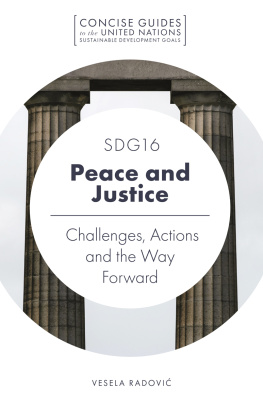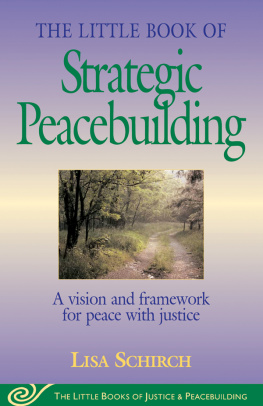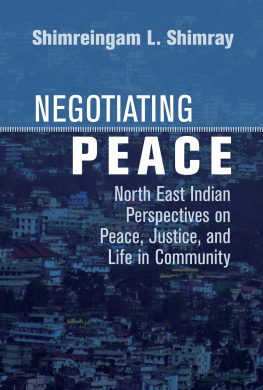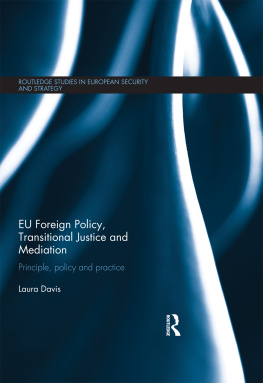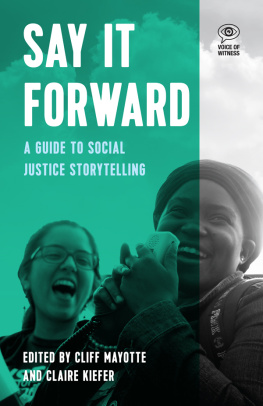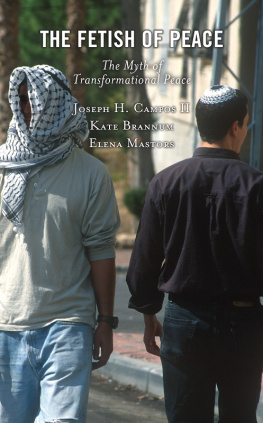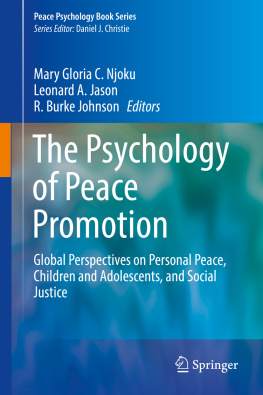SDG16 PEACE AND JUSTICE
CONCISE GUIDES TO THE UNITED NATIONS SUSTAINABLE DEVELOPMENT GOALS
Series Editors
Walter Leal Filho
World Sustainable Development Research and Transfer Centre, Hamburg University of Applied Sciences, Germany
Mark Mifsud
Centre for Environmental Education and Research, University of Malta, Malta
This series comprises 17 short books, each examining one of the UN Sustainable Development Goals.
The series provides an integrated assessment of the SDGs from an economic, social, environmental and cultural perspective. Books in the series critically analyse and assess the SDGs from a multidisciplinary and a multiregional standpoint, with each title demonstrating innovation in theoretical and empirical analysis, methodology and application of the SDG concerned.
Titles in this series have a particular focus on the means to implement the SDGs, and each one includes a short introduction to the SDG in question along with a synopsis of their implications on the economic, social, environmental and cultural domains.
SDG16 PEACE AND JUSTICE
Challenges, Actions and the Way Forward
VESELA RADOVI
Belgrade University, Serbia
United Kingdom North America Japan India
Malaysia China
Emerald Publishing Limited
Howard House, Wagon Lane, Bingley BD16 1WA, UK
First edition 2019
Copyright 2019 Vesela Radovi. Published under an exclusive licence.
Reprints and permissions service
Contact:
No part of this book may be reproduced, stored in a retrieval system, transmitted in any form or by any means electronic, mechanical, photocopying, recording or otherwise without either the prior written permission of the publisher or a licence permitting restricted copying issued in the UK by The Copyright Licensing Agency and in the USA by The Copyright Clearance Center. No responsibility is accepted for the accuracy of information contained in the text, illustrations or advertisements. The opinions expressed in these chapters are not necessarily those of the Author or the publisher.
British Library Cataloguing in Publication Data
A catalogue record for this book is available from the British Library
ISBN: 978-1-78973-480-5 (Paperback)
ISBN: 978-1-78973-477-5 (E-ISBN)
ISBN: 978-1-78973-479-9 (Epub)
CONTENTS
Lists of Boxes, Tables and Figures
About the Author
Acknowledgements
LISTS OF BOXES, TABLES AND FIGURES
Boxes
Tables
Figures
ABOUT THE AUTHOR
Vesela Radovi is a Senior Researcher at the Institute for Multidisciplinary Research, Belgrade University, Serbia. She has a long record of experience as an Expert in environmental protection and disaster management gained in the area of civil defence. As a Professor and Acting Dean at the Faculty of Applied Security, EDUCONS University, she established specific courses related to crisis management and conflict solution in the Republic of Serbia. She has conducted trans-disciplinary research that measures the interactive effects of economic, social and economic determinants of emergencies on sustainable development in Serbia and works as a Regional Expert in sustainable development. She has published three books and more than 150 scientific papers in Serbia and abroad.
ACKNOWLEDGEMENTS
Dr Radovi would like to thank the two anonymous reviewers for their valuable comments. Ruth Trumble, from The University of Wisconsin also gave much assistance. Particular gratitude is owed to Professor Natalija Bogdanov, Faculty of Agriculture, Belgrade University, who leads the project The Rural Labour Market and Rural Economy of Serbia Income Diversification and Reduction of Poverty financed by the Ministry of Science of the Republic of Serbia (No. 179028), especially for her contribution to the section on the New Serbian policy of rural development based on Environmental Justice.
INTRODUCTION
Prima facie, the title of this book appears to be three topics interconnected by the fabric of human survival (peace, justice and an inclusive society). Sustainable development goal (SDG) 16 Promote peaceful and inclusive societies for sustainable development, provide access to justice for all and build effective, accountable and inclusive institutions at all levels can be defined as the most ambitious of all the SDGs. Therefore, the author will present in three chapters the basic elements included in Agenda 2030, followed by previous and recent research on the idea of a peaceful global community in the twenty-first century. is devoted to the inclusive society and all the efforts and obstacles which come with the target of Agenda 2030 of ensuring that, no one is left behind. It refers to the need to include every member of vulnerable and marginalised groups in societal processes and conveys the notion that people should not only be allowed to thrive but should also have a chance to participate and shape the course of development. Short subchapters are devoted to migrants, women and disabled people who are valuable for building a more inclusive society in general and, of course, in achieving the declared SDG16 targets in this area. The book concludes with the statement that in the less than five years since the UN Agenda 2030 was adopted, there are still many issues to be solved on the path to achieving its SDGs. Many academics recognise the achievement of SDG16 as one of the most challenging in a complex global society. Nevertheless, it is evident that we are on the right path and, as with every path, we have to be aware of existing obstacles.
1
PEACE IN THE 2030 AGENDA
International relations in the twenty-first century can be described as being full of sudden tensions, sometimes even between historical alliances. The Islamic State (ISIS) militant group triggered the mass mobilisation of many diverse parties to stop human suffering on several continents. Local wars and conflicts are threats which jeopardise the sustainable future of many countries in the world. Therefore, the inclusion of SDG16 in the 2030 Agenda for Sustainable Development represents a fundamental shift in the global development landscape through the recognition that there can be no sustainable development without peace and no peace without sustainable development. Bonian Golmohammadi addresses the importance of future efforts to realise goal 16, the inclusion of a goal on Peaceful Societies in the post-2015 development agenda is half of the battle; ensuring that it includes realistic, measurable and desirable targets is the other (WFUNA, 2014). In the future, all of us have to be aware of the importance of: keeping the peace; increasing stability and resilience which are at risk from many threats (terrorism being one of the most serious); and embracing and creating adequate policies for the implementation of SDG16 together with all the other SDGs.
1.1. SDG16 IN THE 2030 AGENDA FOR SUSTAINABLE DEVELOPMENT
In 2015, when world leaders adopted the post-2015 sustainable development agenda Transforming Our World: the 2030 Agenda for Sustainable Development



